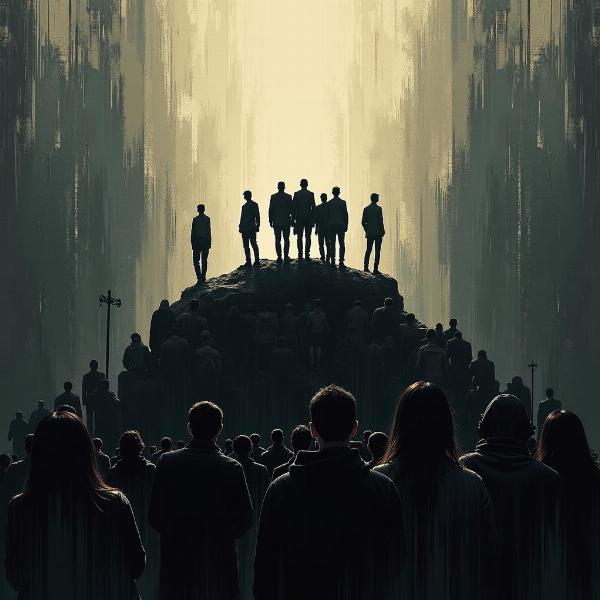Understanding the different forms of government is crucial for anyone interested in politics, civics, or even just current events. Knowing what “forms of government” means in Hindi (शासन प्रणाली – shasan pranali) opens up a deeper understanding of how different countries and societies function. This article will explore various forms of government, their Hindi equivalents, and their implications for citizens.
Exploring Different Shasan Pranalis (Forms of Government)
What exactly are “forms of government,” or शासन प्रणाली? It refers to the system by which a state or community is governed. There are numerous forms, each with its own structure, power dynamics, and impact on the lives of the people it governs. Let’s dive into some of the most common ones.
Democracy (लोकतंत्र – Loktantra)
Perhaps the most widely discussed form of government, democracy, or लोकतंत्र, emphasizes the rule of the people. Citizens have the power to elect their representatives and participate in decision-making processes. India, for instance, is a parliamentary democracy, where the parliament holds the supreme power.
Monarchy (राजतंत्र – Rajtantra)
In contrast to democracy, a monarchy, or राजतंत्र, places power in the hands of a single individual, usually a king or queen. This power can be absolute or constitutional, with varying degrees of influence from other governing bodies.
Oligarchy (अल्पतंत्र – Alptantra)
An oligarchy, or अल्पतंत्र, is a form of government where power rests with a small group of individuals, often based on wealth, family ties, or military control. This elite group makes decisions that benefit their interests, often at the expense of the broader population.
 Representation of Oligarchy
Representation of Oligarchy
Dictatorship (तानाशाही – Tanasahi)
A dictatorship, or तानाशाही, is characterized by absolute, authoritarian rule by a single individual or a small group. Dictatorships often suppress opposition and limit individual freedoms.
Republic (गणराज्य – Ganrajya)
A republic, or गणराज्य, is a form of government where the head of state is not a monarch. Power is typically held by elected representatives and a constitution outlines the principles of governance.
Theocracy (धर्मतंत्र – Dharmatantra)
A theocracy, or धर्मतंत्र, is a system of government where religious law is the supreme authority. Religious leaders hold significant political power and decisions are based on religious doctrines.
Forms of Government: Why Understanding Matters
Knowing the various forms of government and their Hindi equivalents is essential for understanding political discourse, news, and historical events. It allows for a more nuanced understanding of power structures and the impact of different governing systems on citizens’ lives.
What Happens After Understanding “Forms of Government”?
Understanding “forms of government” allows you to critically analyze political systems, engage in informed discussions, and advocate for positive change. It empowers you to become a more active and engaged citizen.
Conclusion
This article has explored various “forms of government,” their meaning in Hindi (शासन प्रणाली – shasan pranali), and their significance. From democracy (लोकतंत्र – Loktantra) to theocracy (धर्मतंत्र – Dharmatantra), each system has unique characteristics and implications for the people it governs. Understanding these differences is crucial for navigating the complex political landscape of our world.
FAQ
- What is the Hindi word for “forms of government”? The Hindi word for “forms of government” is शासन प्रणाली (shasan pranali).
- What is the difference between a republic and a democracy? While often used interchangeably, a republic is a broader term referring to a non-monarchical state, while a democracy specifically emphasizes the rule of the people.
- What is an example of a theocracy? Historically, many societies have been governed by theocratic principles.
- Why is it important to understand different forms of government? Understanding different forms of government allows for informed political participation and critical analysis of political systems.
- Where can I learn more about specific forms of government? You can explore resources like academic journals, books, and reputable online platforms for more in-depth information.
- Is India a republic or a democracy? India is both a republic and a democracy.
- What is the most common form of government today? Various forms of government exist today, including democracies, republics, and monarchies.
Meaning-Hindi.in offers professional translation services in Hindi and other languages, specializing in business, legal, technical, website localization, educational, and other specialized fields. Our expertise ensures accurate and culturally sensitive translations for diverse clients. For high-quality translation services, contact us at [email protected] or call us at +91 11-4502-7584. Meaning-Hindi.in is your trusted partner for all your translation needs.